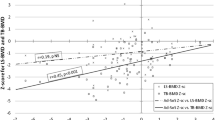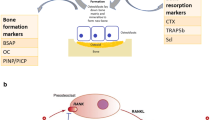Abstract
Background
The management of steroid-sensitive nephrotic syndrome (SSNS) requires treatment with high-dose glucocorticoids (GCs), but GC usage causes the most frequent form of drug-induced osteoporosis. The aim of our study was to evaluate the impact of GCs on bone mineralization in patients with SSNS using two diagnostic tools, dual-energy X-ray densitometry (DXA) and quantitative ultrasound (QUS), and to compare the diagnostic efficacy of these two imaging tools.
Methods
A total of 30 children with SSNS (age 5.20 ± 2.20 years) were evaluated at the start (T0) and after 1 (T1), 2.44 ± 0.75 (T2, 18 patients) and 5.96 ± 2.33 years (T4, 12 patients) of GC treatment. Patients who stopped at T2 were also evaluated at the 1-year timepoint after ceasing GC treatment (T3).
Results
Of the patients assessed at T2, 11 had bone mineralization at the lower limit of normal versus those at T0 and T1, with bone mineralization rescue at the 1-year timepoint after GC discontinuation. At T4, 6/12 patients had densitometric parameters at the lower limit of normal values, and 3/12 patients showed reduced bone mineralization. The parameters derived from measurements of DXA and QUS were significantly related to each timepoint.
Conclusions
Patients with SSNS receiving GC therapy undergo bone status alteration related to the dosage and duration of the therapy. In terms of diagnostic efficacy, DXA and QUS were comparable, indicating that QUS is a reliable tool to evaluate bone health in children with SSNS.


Similar content being viewed by others
References
van Staa TP, Cooper C, Leufkens HG, Bishop N (2003) Children and the risk of fractures caused by oral corticosteroids. J Bone Miner Res 18:913–918
Canalis E, Mazziotti G, Giustina A, Bilezikian JP (2007) Glucocorticoid-induced osteoporosis: pathophysiology and therapy. Osteoporos Int 10:1319–1328
Ventura A, Brunetti G, Colucci S, Oranger A, Ladisa F, Cavallo L, Grano M, Faienza MF (2013) Glucocorticoid-induced osteoporosis in children with 21-hydroxylase deficiency. Biomed Res Int 2013:250462
O’Brien CA, Jia D, Plotkin LI, Bellido T, Powers CC, Stewart SA, Manolagas SC, Weinstein RS (2004) Glucocorticoids act directly on osteoblasts and osteocytes to induce their apoptosis and reduce bone formation and strength. Endocrinology 145:1835–1841
Faienza MF, Brunetti G, Colucci S, Piacente L, Ciccarelli M, Giordani L, Del Vecchio GC, D’Amore M, Albanese L, Cavallo L, Grano M (2009) Osteoclastogenesis in children with 21-hydroxylase deficiency on long-term glucocorticoid therapy: the role of receptor activator of nuclear factor-kappaB ligand/osteoprotegerin imbalance. J Clin Endocrinol Metab 94:2269–2276
Brunetti G, Faienza MF, PiacenteL VA, Oranger A, Carbone C, Di Benedetto A, Colaianni G, Gigante M, Mori G, Gesualdo L, Colucci S, Cavallo L, Grano M (2013) High dickkopf-1 levels in sera and leukocytes from children with 21-hydroxylase deficiency on chronic glucocorticoid treatment. Am J Physiol Endocrinol Metab 304:E546–E554
Faienza MF, Ventura A, Marzano F, Cavallo L (2013) Postmenopausal osteoporosis: the role of immune system cells. Clin Dev Immunol 2013:575936
Foster BJ, Shults J, Zemel BS, Leonard MB (2004) Interactions between growth and body composition in children treated with high-dose chronic glucocorticoids. Am J Clin Nutr 80:1334–1341
Phan V, Blydt-Hansen T, Feber J, Alos N, Arora S, Atkinson S, Bell L, Clarson C, Couch R, Cummings EA, Filler G, Grant RM, Grimmer J, Hebert D, Lentle B, Ma J, Matzinger M, Midgley J, Pinsk M, Rodd C, Shenouda N, Stein R, Stephure D, Taback S, Williams K, Rauch F, Siminoski K, Ward LM (2014) Skeletal findings in the first 12 months following initiation of glucocorticoid therapy for pediatric nephrotic syndrome. Osteoporos Int 25:627–637
Hogler W, Blimkie CJ, Cowell CT, Kemp AF, Briody J, Wiebe P, Farpour-Lambert N, Duncan CS, Woodhead HJ (2003) A comparison of bone geometry and cortical density at the mid-femur between prepuberty and young adulthood using magnetic resonance imaging. Bone 33:771–778
Bianchi ML (2002) Glucorticoids and bone: some general remarks and some special observations in pediatric patients. Calcif Tissue Int 70:384–390
Halton JM, Atkinson SA, Fraher L, Webber C, Gill GJ, Dawson S, Barr RD (1996) Altered mineral metabolism and bone mass in children during treatment for acute lymphoblastic leukemia. J Bone Miner Res 11:1774–1783
Leonard MB, Feldman HI, Shults J, Zemel BS, Foster BJ, Stallings VA (2004) Long-term, high-dose glucocorticoids and bone mineral content in childhood glucocorticoid-sensitive nephrotic syndrome. N Engl J Med 351:868–875
Burnham JM, Shults J, Petit MA, Semeao E, Beck TJ, Zemel BS, Leonard MB (2007) Alterations in proximal femur geometry in children treated with glucocorticoids for Crohn disease or nephrotic syndrome: impact of the underlying disease. J Bone Miner Res 22:551–559
Wetzsteon RJ, Shults J, Zemel BS, Gupta PU, Burnham JM, Herskovitz RM, Howard KM, Leonard MB (2009) Divergent effects of glucocorticoids on cortical and trabecular compartment BMD in childhood nephrotic syndrome. J Bone Miner Res 24:503–513
Tsampalieros A, Gupta P, Denburg MR, Shults J, Zemel BS, Mostoufi-Moab S, Wetzsteon RJ, Herskovitz RM, Whitehead KM, Leonard MB (2013) Glucocorticoid effects on changes in bone mineral density and cortical structure in childhood nephrotic syndrome. J Bone Miner Res 28:480–488
Krieg MA, Barkmann R, Gonnelli S, Stewart A, Bauer DC, Del Rio BL, Kaufman JJ, Lorenc R, Miller PD, Olszynski WP, Poiana C, Schott AM, Lewiecki EM, Hans D (2008) Quantitative ultrasound in the management of osteoporosis: the 2007 ISCD Official Positions. J Clin Densitom 11:163–187
Baroncelli GI, Federico G, Bertelloni S, Sodini F, De Terlizzi F, Cadossi R, Saggese G (2003) Assessment of bone quality by quantitative ultrasound of proximal phalangeas of the hand and fracture rate in children and adolescents with bone and mineral disorders. Pediatr Res 54:125–136
Christoforidis A, Printza N, Gkogka C, Siomou E, Challa A, Kazantzidou E, Kollios K, Papachristou F (2011) Comparative study of quantitative ultrasonography and dual-energy X-ray absorptiometry for evaluating renal osteodystrophy in children with chronic kidney disease. J Bone Miner Metab 29:321–327
Guglielmi G, de Terlizzi F, Aucella F (2004) Quantitative bone ultrasonography: state of the art and perspectives. G Ital Nefrol 21:343–354
Di Mase R, Cerbone M, Improda N, Esposito A, Capalbo D, Mainolfi C, Santamaria F, Pignata C, Salerno M (2012) Bone health in children with long-term idiopathic subclinical hypothyroidism. Ital J Pediatr 38:56
International Study of Kidney Disease in Children (1981) The primary nephrotic syndrome in children. Identification of patients with minimal change nephrotic syndrome from initial response to prednisone. A report of the International Study of Kidney Disease in Children. J Pediatr 98:561–564
Schwartz GJ, Haycock GB, Edelmann CM Jr, Spitzer A (1976) A simple estimate of glomerular filtration rate in children derived from body length and plasma creatinine. Pediatrics 58:259–263
Cacciari E, Milani S, Balsamo A, Spada E, Bona G, Cavallo L, Cerutti F, Gargantini L, Greggio N, Tonini G, Cicognani A (2006) Italian cross-sectional growth charts for height, weight and BMI (2 to 20 yr). J Endocrinol Investig 29:581–593
Cole TJ, Bellizzi MC, Flegal KM, Dietz WH (2000) Establishing a standard definition for child overweight and obesity worldwide: international survey. BMJ 320:1240–1243
Tanner JM, Whitehouse RH (1976) Clinical longitudinal standards for height, weight, height velocity, weight velocity, and stages of puberty. Arch Dis Child 51:170–179
Lombel RM, Gipson DS, Hodson EM (2013) Treatment of steroid-sensitive nephrotic syndrome: new guidelines from KDIGO. Pediatr Nephrol 28:415–426
Baroncelli GI, Federico G, Vignolo M, Valerio G, del Puente A, Maghnie M, Baserga M, Farello G, Saggese G (2006) Phalangeal Quantitative Ultrasound Group. Cross-sectional reference data for phalangeal quantitative ultrasound from early childhood to young-adulthood according to gender, age, skeletal growth, and pubertal development. Bone 39:159–173
Shults J, Morrow AL (2002) Use of quasi-least squares to adjust for two levels of correlation. Biometrics 58:521–530
Shults J, Ratcliffe SJ, Leonard M (2007) Improved generalized estimating equation analysis via xtqls for quasi-least squares in Stata. Stata J 7:147–166
Gordon CM, Lewiecki EM, Baim S, Leonard MB, Bishop NJ, Bianchi ML, Kalkwarf HJ, Langman CB, Plotkin H, Rauch F, Zemel BS, Binkley N, Bilezikian JP, Kendler DL, Hans DB, Silverman S (2008) International Society for Clinical Densitometry Adult and Pediatric Official Positions. Bone 43:1115–1121
Wüster C, Albanese C, De Aloysio D, Duboeuf F, Gambacciani M, Gonnelli S, Glüer CC, Hans D, Joly J, Reginster JY, De Terlizzi F, Cadossi R (2000) Phalangeal osteosonogrammetry study (PhOS): age related changes, diagnostic sensitivity and discrimination power. J Bone Miner Res 15:1603–1614
Knapp KM (2009) Quantitative ultrasound and bone health. Salud Publica Mex 51:S18–S24
Gulati S, Sharma RK, Gulati K, Singh U, Srivastava A (2005) Longitudinal follow-up of bone mineral density in children with nephrotic syndrome and the role of calcium and vitamin D supplements. Nephrol Dial Transplant 20:1598–1603
Gafni RI, Weise M, Robrecht DT, Meyers JL, Barnes KM, De-Levi S, Baron J (2001) Catch-up growth is associated with delayed senescence of the growth plate in rabbits. Pediatr Res 50:618–623
Henderson RC, Madsen CD, Davis C, Gold SH (1998) Longitudinal evaluation of bone mineral density in children receiving chemotherapy. J Pediatr Hematol Oncol 20:322–326
Skrzypczyk P, Panczyk-Tomaszewska M, Roszkowska-Blaim M, Wawer Z, Bienias B, Zajgzkowska M, Kilis-Pstrusinska K, Jakubowska A, Szczepaniak M, Pawlak-Bratkowska M, Tkaczyk M (2014) Long-term outcomes in idiopathic nephrotic syndrome: from childhood to adulthood. Clin Nephrol 81:166–173
Author information
Authors and Affiliations
Corresponding author
Rights and permissions
About this article
Cite this article
Aceto, G., D’Addato, O., Messina, G. et al. Bone health in children and adolescents with steroid-sensitive nephrotic syndrome assessed by DXA and QUS. Pediatr Nephrol 29, 2147–2155 (2014). https://doi.org/10.1007/s00467-014-2834-3
Received:
Revised:
Accepted:
Published:
Issue Date:
DOI: https://doi.org/10.1007/s00467-014-2834-3




